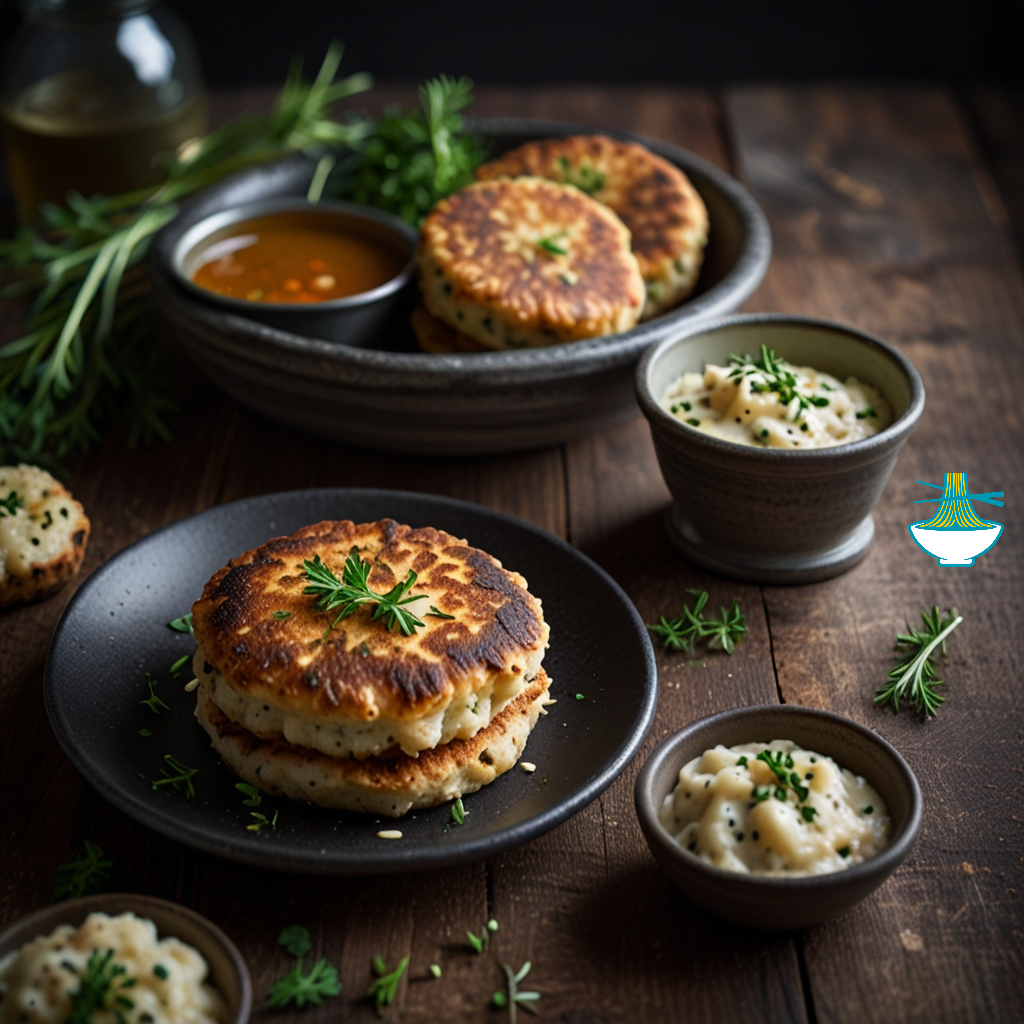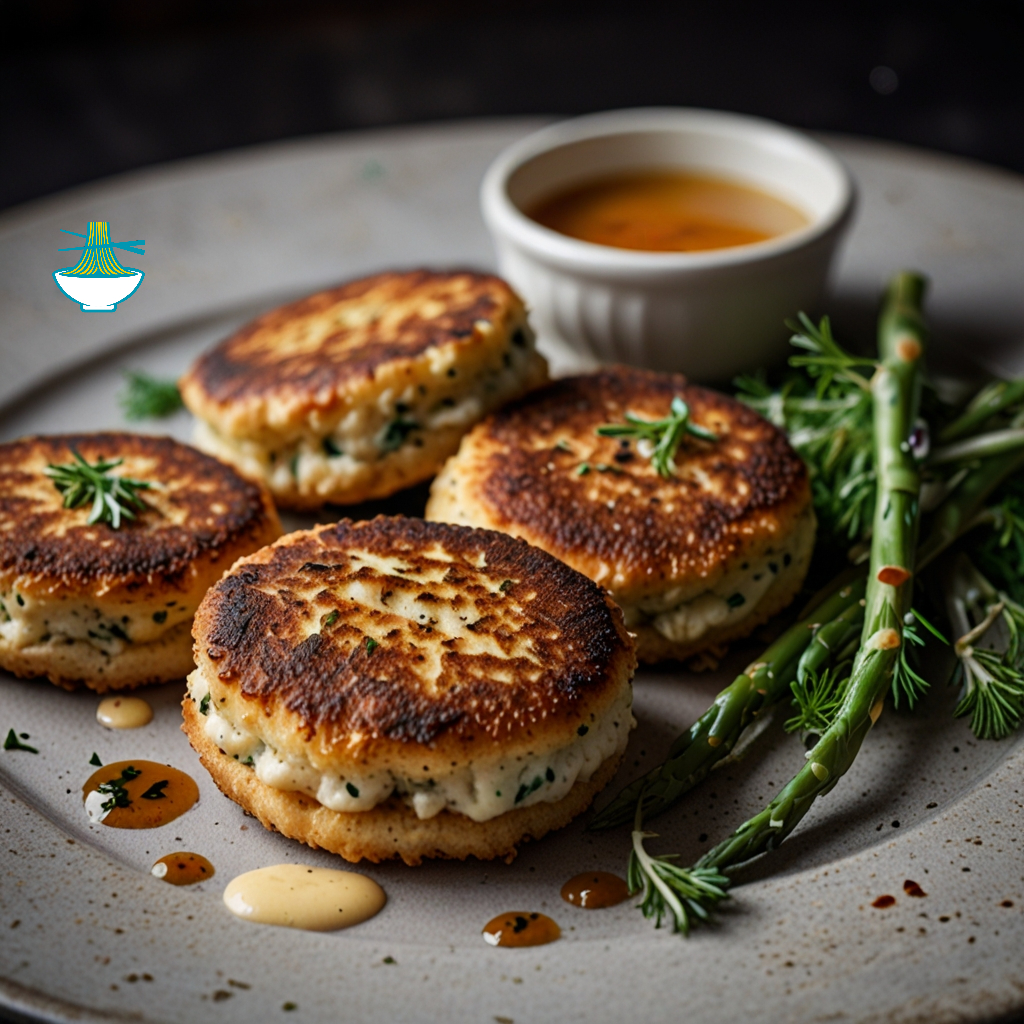Welsh Fishcakes are a delicious dish made from fresh fish, typically cod or haddock, mixed with creamy mashed potatoes, herbs like parsley or chives, and seasoned with salt and pepper. The mixture is formed into patties and lightly fried until golden and crispy on the outside, while remaining tender and flavorful on the inside. These fishcakes are often served with a tangy sauce, such as tartar sauce or a lemon herb aioli, adding a delightful contrast to the richness of the cakes.
The history of Welsh Fishcakes traces back to Wales, where they are a popular part of traditional Welsh cuisine. The recipe likely originated as a way to make use of leftover fish and potatoes, creating a tasty and satisfying meal. Over time, Welsh Fishcakes have become a beloved dish enjoyed not only in Wales but also in various regions where fresh fish and potatoes are abundant. They showcase the simplicity and ingenuity of classic Welsh cooking, combining humble ingredients to create a dish that's both comforting and flavorful.
Ingredients:
- 400g fresh fish fillets (such as cod or haddock), skinless and boneless
- 400g potatoes, peeled and diced
- 2 tablespoons chopped fresh parsley
- Salt and pepper to taste
- 2 tablespoons olive oil for frying
Sauce (optional):
- 1/2 cup mayonnaise
- 1 tablespoon lemon juice
- 1 tablespoon chopped fresh dill or chives
Method of Preparation:
1. Boil the potatoes in salted water until tender, then drain and mash them thoroughly.
2. In a separate pan, poach the fish fillets in simmering water until cooked through. Drain and flake the fish into small pieces.
3. Mix the mashed potatoes, flaked fish, chopped parsley, salt, and pepper in a bowl until well combined.
4. Shape the mixture into round patties or cakes.
5. Heat olive oil in a non-stick skillet over medium heat.
6. Fry the fishcakes for about 4-5 minutes on each side, or until golden and crispy.
7. For the sauce (if using), mix mayonnaise, lemon juice, and chopped herbs together.
8. Serve the Welsh Fishcakes hot, with the optional sauce on the side.
Nutrition Value:
1. Fresh Fish Fillets (such as cod or haddock) - 400g:
- Calories: Approximately 340 kcal
- Carbohydrates: 0g
- Protein: Approximately 80g
- Fat: Approximately 2g (varies slightly based on fish type)
- Sodium: Varies based on preparation, typically low
- Cholesterol: Varies based on fish type, generally low to moderate
- Nutritional Benefits: High-quality protein, omega-3 fatty acids for heart health, vitamin B12 for nerve function, and minerals like selenium and phosphorus for overall health.
2. Potatoes - 400g:
- Calories: Approximately 280 kcal
- Carbohydrates: Approximately 65g
- Protein: Approximately 7g
- Fat: Approximately 0g
- Sodium: Varies based on preparation, typically low
- Cholesterol: 0mg
- Nutritional Benefits: Good source of complex carbohydrates for energy, vitamin C for immune support, potassium for heart health, and fiber for digestion.
3. Chopped Fresh Parsley - 2 tablespoons:
- Calories: Approximately 2 kcal
- Carbohydrates: Approximately 0.4g
- Protein: Approximately 0.2g
- Fat: Approximately 0g
- Sodium: 1mg
- Cholesterol: 0mg
- Nutritional Benefits: Rich in vitamin K for bone health, vitamin C for immune support, antioxidants for reducing inflammation, and folate for cell function.
4. Salt and Pepper (to taste):
- Calories: Negligible
- Carbohydrates: Negligible
- Protein: Negligible
- Fat: Negligible
- Sodium: Varies based on amount used
- Cholesterol: 0mg
- Nutritional Benefits: Minimal, primarily used for flavor enhancement.
5. Olive Oil for Frying - 2 tablespoons:
- Calories: Approximately 240 kcal
- Carbohydrates: 0g
- Protein: 0g
- Fat: Approximately 28g
- Sodium: 0mg
- Cholesterol: 0mg
- Nutritional Benefits: Healthy monounsaturated fats, antioxidants like vitamin E, anti-inflammatory properties, and may support heart health.
Sauce (optional):
1. Mayonnaise (1/2 cup):
- Calories: Approximately 720 kcal
- Carbohydrates: Approximately 0.6g
- Protein: Approximately 0.6g
- Fat: Approximately 80g
- Sodium: Approximately 1200mg
- Cholesterol: Approximately 60mg
- Nutritional Benefits: Provides energy from fats, contains vitamin E, and may include omega-3 fatty acids if made with certain oils like olive oil.
2. Lemon Juice (1 tablespoon):
- Calories: Approximately 4 kcal
- Carbohydrates: Approximately 1.3g
- Protein: Approximately 0.1g
- Fat: Approximately 0g
- Sodium: 0mg
- Cholesterol: 0mg
- Nutritional Benefits: Rich in vitamin C for immune support, aids digestion, and adds a tangy flavor to dishes.
3. Chopped Fresh Dill or Chives (1 tablespoon):
- Calories: Approximately 1-2 kcal (negligible)
- Carbohydrates: Approximately 0.2-0.3g (negligible)
- Protein: Approximately 0.1-0.2g (negligible)
- Fat: Approximately 0g
- Sodium: 1-2mg
- Cholesterol: 0mg
- Nutritional Benefits: Good source of vitamins A and C, antioxidants, and may have mild digestive benefits.
Keep in mind that the nutritional values for the sauce are approximate and can vary based on the specific brand of mayonnaise and the amount of dill or chives used.


Comments